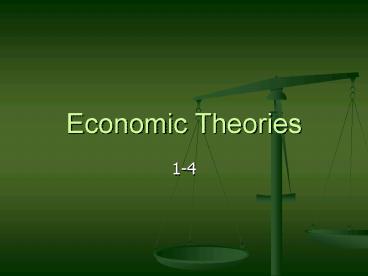Economic Theories - PowerPoint PPT Presentation
1 / 8
Title:
Economic Theories
Description:
Some socialists favored taking over government by means of revolution, while ... Socialist governments have taken power in several countries: however, critics ... – PowerPoint PPT presentation
Number of Views:182
Avg rating:3.0/5.0
Title: Economic Theories
1
Economic Theories
- 1-4
2
Are You Aware?
- Kuwait has a very small population, while also
having some of the worlds greatest oil wealth? - The Kuwaiti economy allows free health care,
education (through Ph.D.), and other amazing
benefits to its citizens. - America, on the other hand, has more people. So
we provide an equal opportunity to fight over the
money.
3
I. The Role of Economic Systems (p. 26)
- Governments provide for many different kinds of
economic systems. - Economic systems make decisions about what goods
and services should be produced, how they should
be produced, and who gets them. - Is government involvement necessary for economic
systems to function? Why?
4
II. Capitalism (p.26-28)
- Capitalism is based on free enterprise, or
individual economic choices. - Capitalism developed gradually from the economic
and political changes in medieval and early
modern Europe. - The United States has a capitalist economy, but
government plays a role. - Governments role in the US economy has increased
since the early 1900s. - Today the US has a mixed market economy,
incorporating both free enterprise government
regulation of business and industry.
5
III. Socialism (p.28)
- Under socialism, government owns the basic means
of production, plans the use of resources,
distributes many products and wages, and provides
basic social services. - Socialism developed in Europe during the
nineteenth century. - Some socialists favored taking over government by
means of revolution, while other socialists
believed in democratic socialism, in which
economic conditions change peacefully and people
have freedom and rights.
6
- Socialist governments have taken power in several
countries however, critics argue that this
economic system fails to solve most economic
problems.
7
IV. Communism (p.29-30)
- Communism is based on the nineteenth-century
ideas of Karl Marx, who argued that capitalism
exploited workers to benefit a small group of
capitalists who controlled the economy. - Marx predicted that workers would eventually rise
in a violent revolution, which would result in
government ownership of all means of production
and distribution when all property was held in
common, there would be no need for government.
8
- In communist nations, government makes all
economic decisions owns the land, natural
resources, industry, banks, and transportation
systems and controls all mass communication.
(5-year plans) - Compare Contrast Capitalism, Socialism,
Communism. - Who benefits?
- Who suffers?
- Pros
- Cons































